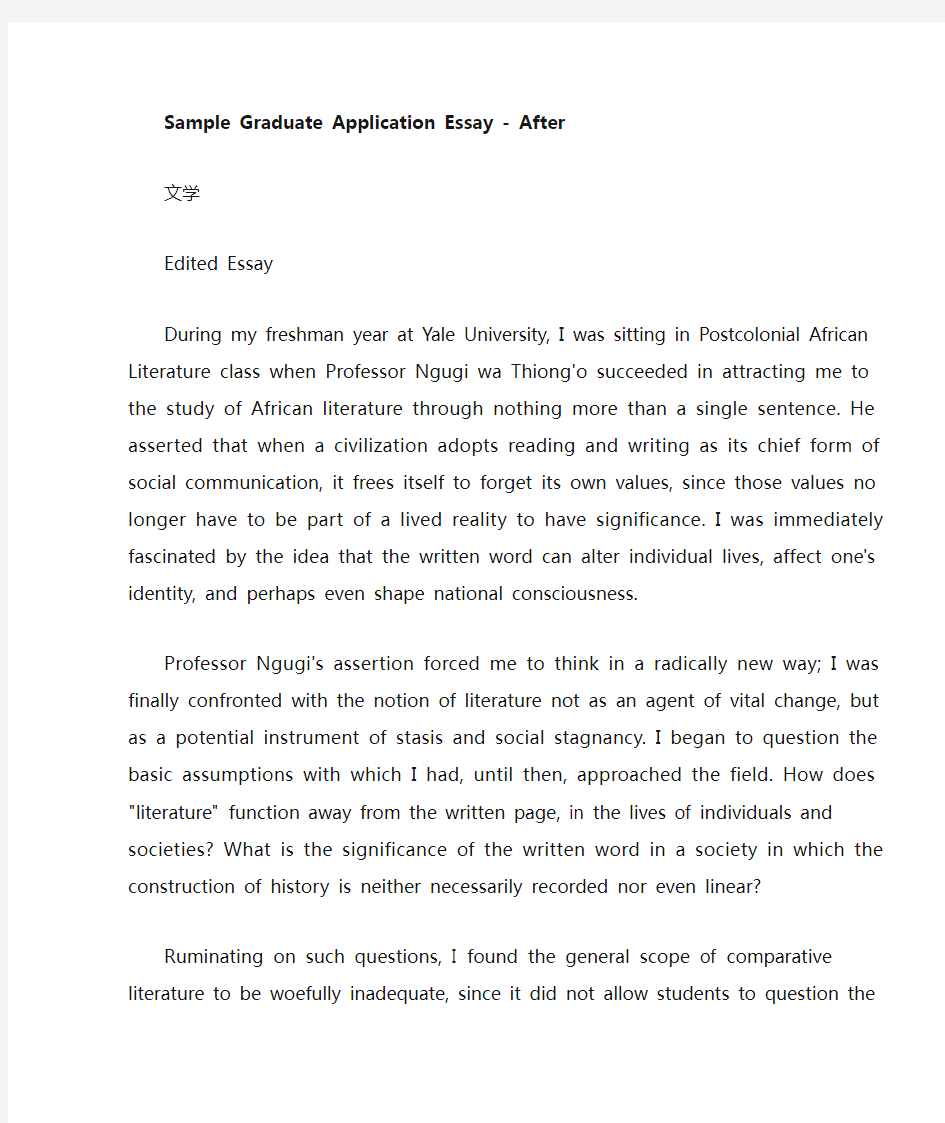留学文书范文Sample Graduate Application Essay

- 1、下载文档前请自行甄别文档内容的完整性,平台不提供额外的编辑、内容补充、找答案等附加服务。
- 2、"仅部分预览"的文档,不可在线预览部分如存在完整性等问题,可反馈申请退款(可完整预览的文档不适用该条件!)。
- 3、如文档侵犯您的权益,请联系客服反馈,我们会尽快为您处理(人工客服工作时间:9:00-18:30)。
Sample Graduate Application Essay - After
文学
Edited Essay
During my freshman year at Yale University, I was sitting in Postcolonial African Literature class when Professor Ngugi wa Thiong'o succeeded in attracting me to the study of African literature through nothing more than a single sentence. He asserted that when a civilization adopts reading and writing as its chief form of social communication, it frees itself to forget its own values, since those values no longer have to be part of a lived reality to have significance. I was immediately fascinated by the idea that the written word can alter individual lives, affect one's identity, and perhaps even shape national consciousness.
Professor Ngugi's assertion forced me to think in a radically new way; I was finally confronted with the notion of literature not as an agent of vital change, but as a potential instrument of stasis and social stagnancy. I began to question the basic assumptions with which I had, until then, approached the field. How does "literature" function away from the written page, in the lives of individuals and societies? What is the significance of the written word in a society in which the construction of history is neither necessarily recorded nor even linear?
Ruminating on such questions, I found the general scope of comparative literature to be woefully inadequate, since it did not allow students to question the inherent integrity or subjectivity of their discourse. Comparative literature approaches Asian, African, European, and American texts with the same analytical tools, ignoring the fact that, within each culture, literature may function in a different capacity and with a completely different sense of urgency. Seeking out ways in which literature tangibly impacted societies, I began to explore other fields, including history, philosophy, anthropology, language, and performance studies.
The interdisciplinary nature of my work is best illustrated by my senior thesis, "Time Out of Joint: Issues of Temporality in the Songs of Okot p'Bitek." In addition to my literary interpretations, the thesis drew heavily upon both the Ugandan author's own cultural treatises and other anthropological, psychological, and philosophical texts. By using tools from other disciplines, I was able to interpret the author's literary works while developing insight into Ugandan society and the popular psychology that gave birth to the horrific Idi Amin regime. In addition, I was able to understand further how people interacted with the author's works and incorporated (or failed to incorporate) them into their individual, social, and political realities.
On a more practical level, writing my thesis also confirmed my suspicion that I would like to pursue an academic career. When I finished my undergraduate studies, I felt that a couple of years of professional work would give me a better perspective on graduate school. I decided to secure a position that would grant me experiences far removed from the academic world, yet which would also permit me to continue developing the research and writing skills that I needed to tackle the challenges of a future academic career. I have fulfilled this goal by working as a content developer at a Silicon Valley Internet company for the past two years. The experience has been both enjoyable and invaluable--to the point that colleagues glance at me with a puzzled look when I tell them that I am leaving the job to return to school. In fact, my willingness to leave such a dynamic, high-paying job to pursue my passion for literature reflects my keen determination to continue along the academic path.
Through a master's degree program, I plan to explore further the issues I confronted during my undergraduate years by integrating the study of social, cultural, and linguistic anthropology into
